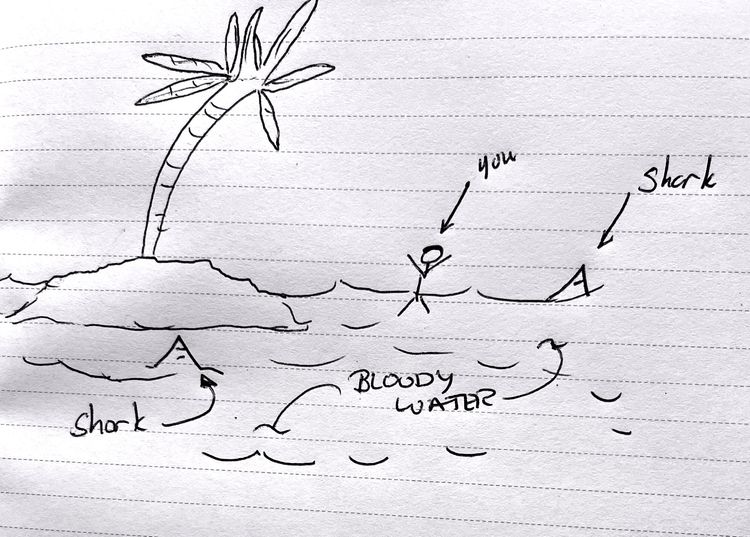Writing D&D Game Modules and Adventures

I’ve written a few articles on this site about Dungeons and Dragons (DnD) and some of its alternatives. When our 6 month (or so) Tomb of Horrors game came to the expected conclusion (80% of us died), we game players decided to take a break over the holidays and regroup in 2024.
A few of us discussed playing a different kind of role playing game. Ideas of a Zombie Apocalypse or Cyberpunk type game were bandied about. This led me to spend the holidays researching different games and generic role playing systems to find something fun we could all play.
I ended up going down the metaphorical rabbit hole on this one and got heavy into the theory of generic roleplaying game systems and understanding how they work. I discovered FUDGE and GURPS, both well-documented and tested game systems for just about any kind of game style and setting you can think of.
This was exciting. I could dream of building a Wild West style game or a post Climate Change apocalypse adventure. The generic game systems were both capable and made sense, especially when using a type of z-based score method for abilities and skills.
Despite the possibilities, I’ve always come back to the simple fact that no matter what game system, generic or not, what matters is getting together with friends and deciding on some rules that everyone can “live” with. It could be as simple as knowing with poker hands beat the other or as intricate as the DnD 5th edition.
Writing D&D games
At the beginning of 2023, I decided to challenge myself and write a few short D&D adventure modules. I had a goal of writing 12 game modules but I ended up getting 8 things done. Some were D&D game modules and others were game world settings like the World of Amum. I put them all on my Ko-fi shop page and made them free for download and use. I did that because I’m a big believer in open source gaming.
I wasn’t bothered at all by not reaching my goal of 12 games because of what I learned in the process. I realized that my zeal for writing these games was quickly tempered by the demand for detail and understanding of game systems and their mechanics.
Writing D&D games is vastly different than running or playing D&D games. On top of that, I added a level of complexity because I wanted each game to be game system neutral and independent. I wanted to focus more on the adventure and the story and play these games in one night or sitting.
Of course, this unraveled a big ball of yarn and I realized quickly that I bit off more than I could chew. All the “holes” in the story and game glared at me when we play tested each game.
I remember creating a backstory of “snow elves” and a special tipped arrow that incapacitates Frost Giants in my Survive the Silverwall Pass wilderness adventure. This entire backstory was moot during the game play, my friends were more concerned with making the Frost Giants more imposing and scary since they were the focus of the game.
Play testing is a humbling experience and I would not skip this step. Ironically, writing these D&D game modules reminded me of product launches in the startup world. Just when you think you’re ready to hit the “go” button, you realize that there are loose ends that need to be tied up.
You need a hook
One of the key things I learned in play testing was that you need at least two but preferably three adventure hooks. These are the hooks that get your players interested in finding that lost treasure or doing a good deed that is needed to save a princess in a high tower.
These hooks not only keep your experienced - and sometimes jaded - players excited. This builds the story and storytelling is a huge part of making any game a success, especially those in the role playing world.
For example, my latest game module (work in progress) has three game hooks:
- The characters are hired by a local historian who is obsessed with solving the mystery of the Montmort family and recovering valuable artifacts from the mansion.
- The characters come across the treasure map mentioned by the treasure hunters in a tavern or marketplace, and they become intrigued by the prospect of finding the hidden treasure.
- A local lord or lady tasks the characters with investigating the undead presence at the mansion, fearing that it might spread and threaten their own lands.
If my players don’t feel hooked by this, then I need to go back to the drawing board. Writing games is different than writing essays or poetry; the latter is about writing for yourself. Writing games is about the players. You need to write games to resonate with an audience first and satisfy their wants and needs.
It's not about you but the players.
The curious problem of GPT
Large language models and implementations like ChatGPT are making an impact in the gaming world. There’s no doubt that game creators are looking at this technology as something exciting and scary simultaneously.
It’s exciting because it can act as an assistant to game creators. It could do the heavy lifting of writing an outline for a new game, or it can analyze the game you already wrote for possible loopholes.
It’s scary because it can just write an entire D&D game module in seconds flat and cut you, the game creator, out of the process. Will game creators and module writers become irrelevant in a post GPT world? The answer is yes, there’s a big possibility this could happen as GPT technology gets better over the next few years.
This does not bode well for small time game creators at all.
To see just how damaging this could be, I experimented with the new offerings that OpenAI has, the writing assistants. I found them to be leaps and bounds ahead of the generic ChatGPT 4. Why? Because they were probably fine tuned on specific sets of data to give them a unique voice. Just using the new Open AI marketplace should strike fear in every game creator.
I’m sure that Hasbro and other large game developing corporations are already looking at customized GPT systems to automate the writing and creation of games. These GPT systems only need hardware and electricity, which can all be written off on their taxes. Hiring and keeping humans is way too messy, they want increased salaries, get sick, and have all kinds of life issues.
I’m sure the trend of layoffs in the gaming industry will only continue in 2024 as corporations "fine tune" staff and technology.
What about the small time game creator like me? I admit, I tested out GPT for my new game module but abandoned it quickly. It was generating names and places that sounded eerily too familiar. That bothered me because it led me to believe that the training dataset the GPT was trained on was using game worlds that “might” be copyrighted. I can’t make any claims that it did or not, but with the recent NY Times lawsuit against OpenAI, you can’t help but wonder where all the data came from.
I support open source gaming systems and games but I don’t support stealing. I don’t support taking someone’s hard work and repacking it to sell for your gain without giving back to the creator. I loathe hiding behind the “it was free/open source on the Internet” strategy so therefore you can’t touch me and I'll take all the money I make off your hard work.
That’s always been the weakness of open source and this system can only truly work if everyone “pays into the kitty” including large corporations with a lot of money.
Writing games for 2024 and beyond
Writing games is hard, there’s no doubt about it. I’m in awe of small time game creators who are both writers and artists. I’ve seen some amazing teams put together fun games with amazing artwork. The sad reality is that many of these small teams won't survive because to live in our world you need to earn money. They might make some money but often naught, it’s not enough, so they close shop and move on.
Some will make it and grow, while others won’t. The trick for successful game developers in a GPT world will be for them to keep their roots and values. As this market shakes out, I believe there will be a growing niche for these small game developers, and my gut tells me that the market will fragment into games that are mass-produced vs authentic ones; ones that are written without the use GPT and AI-generated dungeons.
I believe we’ll see disclaimers such as “not written with GPT” in new games and designating them as “free” D&D game modules with non-commercial licenses. Small game creators will need to start protecting themselves more than ever as they vie for market share or just be able to earn a living off their creativity.
Yes, things are going to change in this industry but one thing will always remain the same, everyone loves a good game.
So, start writing one.





Member discussion